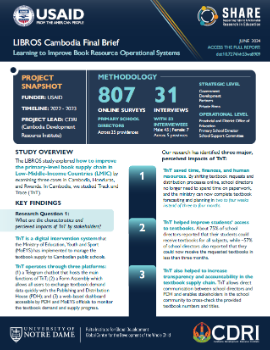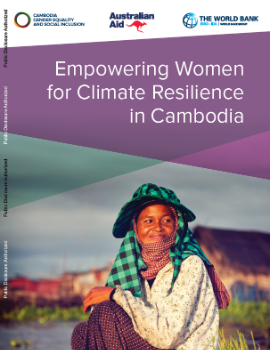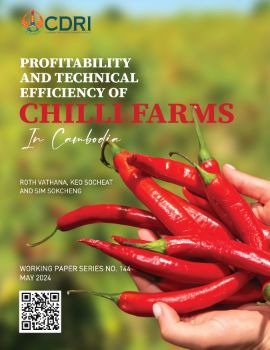
Enhancing Rural Resilience for Climate-Induced Migration Responses
Key MessagesMigrants were mainly young adults, with men doing high-risk jobs like construction and women doing less risky jobs such as factory work. Migrant households’ livelihoods are affected by unpredictable weather conditions, reduced water availability, and extreme events like heatwaves, droughts and floods, which lowered crop yields and fish...

Climate‑related Loss and Damage in Contexts of Agrarian Change: Differentiated Sense of Loss from Extreme Weather Events in Northeast Cambodia
The uneven burden of climate-related losses and damages and its implications for equity and social justice are receiving growing attention in science and policy. Smallholder farmers, indigenous groups, and ethnic minorities are often identifed as particularly vulnerable and likely to experience a greater burden of climate-related loss and damag...

Expertise and Immigrant Status: A Bourdieuisan Analysis of How Citizen-led Aid Organisations Provide Health Care Transnationally
The transnational mobility of people, information, and resources is critical to the success of nonprofit international development projects. Ensuring effective transnational flows arguably takes on greater salience for grassroots international nongovernmental organisations (GINGOs), as these organisations and their leaders are unlikely to have a fu...

Closing the Information Divide: Addressing the Information Needs for Persons with Disabilities in Cambodia
Key Highlights In Cambodia, one in four people over five years old are estimated to have some form of disability. This group tends to be older, female, and residing in rural areas. The most common types of disabilities include difficulties in seeing, remembering, and walking/climbing. Education and work opportunities are limited, especially for wom...

Negotiating Family and Personal Aspirations: Four Young Cambodian Women Reflecting on Choosing a Major
This qualitative study explores how four young Cambodian women navigated the decision-making process of choosing a university major, focusing on the influence of parental guidance and familial expectations. Drawing on in-depth interviews conducted as part of a broader anthropological dissertation, the paper examines how these women—Kravann, Samedy,...

The Emergence of Training Programmes for the Garment Industry: Analysing the Cases of Bangladesh, Cambodia and Sri Lanka from a Historical‐Institution...
This study analyses industry‐specific training programmes catering to the garment industry in Bangladesh, Cambodia and Sri Lanka. Employing a historical‐institutionalist perspective and using mainly qualitative data, it focuses on programmes that are considered particularly relevant by the industry and discuss their characteristics as well as f...

The Reversal of Gender Gap in Learning: Why Boys Are Falling Behind in Upper Secondary Schools
This study investigates the reversal of the gender gap in academic performance in Cambodia’s upper secondary schools, where female students now consistently outperform their male peers. Employing a convergent parallel mixed-methods design, the research combines qualitative interviews and focus group discussions with quantitative surveys across 23 s...

SHARE LIBROS (Learning to Improve Book Resource Operational Systems) Cambodia, Final Brief
This policy brief presents key findings from the technical report "Learning to Improve Book Resource Operational Systems (LIBROS) in Cambodia". The study examined the perceived impacts, development, and implementing factors of the Track and Trace (TnT) system, a digital intervention implemented by the Ministry of Education, Youth, and Sport (MoEYS)...

Empowering Women for Climate Resilience in Cambodia
Cambodia has experienced significant economic growth and improved living standards over the last two decades, and gender equality has also improved, especially on outcomes such as girls and women’s human capital accumulation in education. However, the impacts of climate change could put the hard-earned economic development gains including those of...

Profitability and Technical Efficiency of Chilli Farms in Cambodia
This study investigates the profitability and technical efficiency of chilli farming in Cambodia using data from 542 households and 719 plots across six provinces. Employing a revenue-cost framework and stochastic frontier analysis, the research evaluates yields, input costs, and production efficiency. Bird’s eye and lady’s finger chillies are the...
